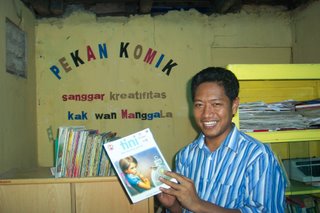 First published in The
First published in The IRWAN TAHIR MANGGALA: PROMOTING EDUCATION IN MALUKU
Alpha Amirrachman, Contributor,
If in
To help improve education in the conflict-torn province, Irwan set up Sanggar Kreativitas Anak (Children's Creativity Studio) in the provincial capital,
At that time, on his own initiative, Irwan set up outdoor English classes to help erase the tragic memories from the minds of the children and improve their English skills before the government and NGOs came to the province to provide more organized assistance.
He later decided to set up the studio dedicated to teaching English to children. Himself a teacher at state Islamic junior high school Madrasah Tsanawiyah Kebon Cengkih,
There are around 200 English books in the studio, mostly donated by concerned parties such as international NGO Save the Children. Almost every day, children arrive to learn English and play games facilitated by Irwan.
Born on
He continued his studies in
Married to Rahmawaty, and with two children, Irwan loved children and dedicated himself to teaching students at junior high school level. After teaching, he always went straight home to take care of his studio.
When The Jakarta Post visited Irwan at his studio, a group of junior high school students were there. They had traveled from
"We came here to learn English from Kak Iwan," said Siti, in the second grade at junior high school, adding that she also wanted to tell Irwan about the disheartening state of education in the newly formed district.
Before the conflict, Irwan had won first prize in the highly-competitive National Teacher Creativity Competition (LKG) held by the Indonesian Institute of Sciences (LIPI) in August 1997 with his Cas Cis Cus English program.
He asked students to role-play specific situations such as in a bank, supermarket, hospital and other public places. Some acted as public officers, others as consumers, in a bid to expose students to English, something lacking in
After the conflict, in a bid at reconciliation to reduce religious tensions, Irwan initiated a "multireligious" soccer game held in a court near his studio, just 50 meters from the location of an-Nur Mosque and
The court itself marked a line that separates Christian from Muslim communities. Children from the two religiously segregated communities were invited to participate in the game. They gleefully joined in -- Muslim children against Christians.
"People think that the area has always been prone to tension. That's not true," said Irwan, adding that about 300 people from the two communities enthusiastically watched the game.
In appreciation for his unremitting dedication to children's education and his valuable role in pursuing reconciliation, Irwan also received an award from the Department of Religious Affairs as Best Teacher in Maluku province on
Irwan is upbeat on prospects for education in Maluku: "People here are generally determined that they can leave behind tragic memories and build a new life. Besides, they all eat fish, which is very healthful for brain development.
"Thus, what we need is proper supporting educational facilities," he said, referring to his soccer game where participating children were high-spirited, and the Cas Cis Cus program where students had no hesitation to speak in English.
No comments:
Post a Comment